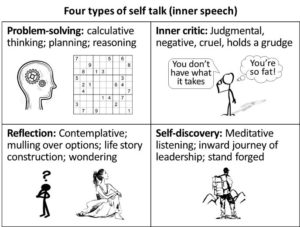Human burnout, a major problem in medicine today is, in a sense, the outcome of competing conversations of self-talk. Physicians want to problem-solve so they can provide the appropriate care for their patients. Now they are being told how much they can spend in the process, which has generated confusion by altering the mix of physician self-talk. The inner critic has numerous issues to gripe about, but these problems require solutions that extend into domains with which physicians are, for the most part, unfamiliar. We know the language of patient care; the language of business is less familiar to us. This gives the inner critic an in. Your inner critic wants to run the show. It will say things to like, “Don’t waste your time on the inward journey” or “Focus on making more money.”
Each of us has a moment to moment inner experience that is largely comprised of thoughts (self-talk), feelings, and mental images. Our inner experiences change – often rapidly and dramatically – depending on our circumstances. Being in touch with this inner experience – especially in today’s volatile and frenetic world – is a key attribute of our most effective leaders. Yet, many people don’t know the features of their inner experience because they don’t take the requisite time to reflect and to get in touch with their internal states and traits.
Self-talk (inner speech, internal narrative) is perhaps the most common way that you and I make sense of the world and get in touch with our inner experience and “reality.” Professor Barbara Hardy, of the University of London, says “we dream in narrative, daydream in narrative, remember, anticipate, hope, despair, believe, doubt, plan, revise, criticize, construct, gossip, learn, hate, and love by narrative.”
Most of us can discover this internal dialogue – we couldn’t survive without it. But the nature of self-talk varies depending on the situation at hand. For example, when working on a crossword puzzle, self-talk is required for “problem-solving.” Other times, our self-talk is more contemplative, speculative, or in the background of daydreaming.
Perhaps the type of self-talk that we are most aware of is what is called the “inner critic.” Your inner critic is like a two-way narrative that shows up for you as an internal conversation with yourself that could be characterized as harsh and uncomplimentary. This inner critic was forged when you were a child and it tends to be judgmental of self and others. While the self-talk associated with problem-solving and reflection is vitally useful, it seems like we could do without our inner critic. But our inner critic is dominant, and it preys on insecurity – when it tells us we’re unattractive or that we’re not smart enough for this or that job, we tend to listen to it. Sometimes, it can “own” us and “run” us like a tyrant. We can’t get rid of our inner critic, but is there a way to get it to pipe down?

The most important category of self-talk relates to our self-discovery on the inward journey of leadership. This internal dialogue is best characterized as a kind of meditative listening. It’s kind of a clearing of the mind so one can listen to one’s higher self. There is a wisdom or sorts that is cultivated in this private time. It was where all our ancestor’s primal insights came from.
Self-talk, especially the listening part of self-talk, is a vital part of the Inward Journey of Leadership. The self-talk of self-discovery will shine light on the limiting “chapters” we wrote that are getting in the way of becoming a more effective leader. More broadly, we acquire insight into how those limiting stories have shaped the way in which we wound up being who we are. Once these encumbering stories are revealed, we can rewrite them, so they live in the past, where they belong. Curiously, it is on the inward journey of leadership that one confronts these stories and, in so doing, lets the inner critic retreat into the background.
The development of self-talk is built-in to the development of higher mental functions, almost all of which stem from our socialization, and in particular the internalized conversations that shape the way in which children “turn out.” Thus, getting in touch with your self-talk is essential for personal transformation. You must come to appreciate how language – especially childhood conversations – in a very real sense made you who you are today.
Hardy B. Towards a poetics of fiction: An approach through narrative. NOVEL: A Forum on Fiction, 1968, 2(1): 5-14.
